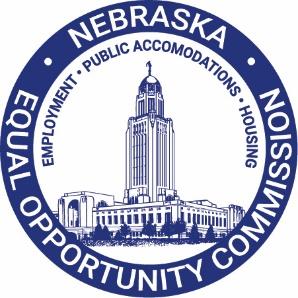Historical Information
The History of the NEOC

The Nebraska Equal Opportunity Commission is a quasi-judicial, administrative agency of the state created by state law for the purpose of receiving, investigating, rendering formal determinations, and conciliating charges of unlawful discrimination in the areas of employment, housing, and public accommodations. It also provides information and assistance in matters of civil rights law compliance to citizens and organizations that request it.
The Commission was created as a result of the desire of the Nebraska Unicameral to make certain that Nebraskans themselves retained the primary authority to deal with civil rights disputes and issues within the State. The agency was established in 1965 by Legislative Bill 656, known as the Nebraska Fair Employment Practice Act. On October 23, 1967, the agency's name was changed to the present title of Nebraska Equal Opportunity Commission by the passage of Legislative Bill 718. Enforcement authority for the Nebraska Equal Pay Act was also added in 1967, and in 1969 the Nebraska Civil Rights Act, which prohibited discrimination in housing and public accommodations, was added to the Commission's jurisdiction. Subsequently, in 1972 the Unicameral passed the Act Prohibiting Unjust Discrimination in Employment Because of Age statute which also vested enforcement authority in the Nebraska Equal Opportunity Commission.
In September 1991, the Fair Housing Act became effective replacing the section of the Nebraska Civil Rights Act which covered housing.
Section 48-1116 of the Nebraska Fair Employment Practice Act provides that the Nebraska Equal Opportunity Commission shall consist of seven members appointed to three-year terms by the Governor. Four commissioners constitute a quorum for conducting its official business, and there are two official commission officers: Chairperson and Vice-Chairperson. The Commission is empowered to appoint an executive director who is directly responsible to it. The executive director in turn has the authority to appoint and supervise the Commission's employees. The first Commission was appointed on September 25, 1965, and began conducting business on October 8, 1965.
Section 48-1117 of the Nebraska Fair Employment Practice Act outlines the general powers and duties of the Commission. These can be summarized as follows:
- To receive, investigate, and pass upon charges of unlawful employment, housing, and public accommodation practices anywhere in the State
- To hold hearings, subpoena witnesses, take sworn testimony and require the production of documents related to discrimination
- To cooperate with the federal government and local human rights agencies
- To attempt to eliminate unlawful employment, housing, and public accommodation practices by means of conference, conciliation, and persuasion
- To require that every employer, employment agency, and labor organization, subject to its jurisdiction, make and keep such records relevant to the determination of whether unlawful employment practices have been or are being committed